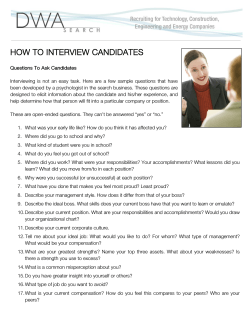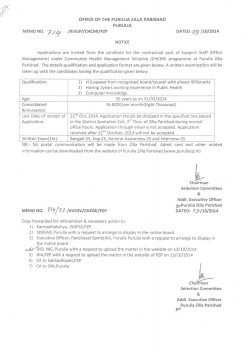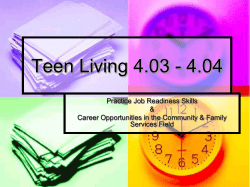
Effective Interviewing
Effective Interviewing Objectives © TNTP 2012 Create an effective interview and candidate evaluation process Develop a series of competency-based interview questions Create school-specific scenario questions to challenge candidates Practice probing questions and techniques Practice identifying excellent answers 2 Agenda Resume Review Developing Questions Differentiating Your Interview Recognizing Good Answers Creating Scenarios Probing Questions Interviewer Bias and Unlawful Interview Questions © TNTP 2012 3 Look for 4 Key Elements When Evaluating A Resume Grammar & Organization • • • Is the resume presented in a professional manner? Are there obvious spelling, grammar or syntax errors? Is the information organized clearly and logically? Dates of Employment • • • • Is the resume up to date? Does the person currently have a job? What is the length of each job held? Are there substantial gaps of time between jobs? Experience (including extracurricular activities) Education & Certification © TNTP 2012 • What is the nature and overall length of their teaching experience? (summer school, tutoring, full time, lead teaching?) • Are there examples of classroom-based achievements? • Did the candidate take on multiple responsibilities at once? (including school related leadership positions) • What awards, merits or distinctions has the candidate earned? • Is there a considerable career shift to or from teaching? • Will this person be licensed when the position begins? • Does the candidate have advanced degrees? Is that degree in a subject-relevant field? • Type of educational training (traditional, alternative, etc.) 4 In addition, look for these and other red flags so that you can ask appropriate follow-up questions Sample resume/cover letter follow-up questions to common red flags © TNTP 2012 Inconsistent work pattern: I’d like to get a better understanding of your employment history. I see that you have held a number of positions over the past years – could you tell me what you did not like about each position? What factors led you to leave each position? Started a job in the middle of the school year: What were you doing prior to taking this job? Left a job in the middle of the school year: Why did you leave this job before the end of the school year (really push for specific reasons)? Only has temporary or substitute positions: Prior to substitute teaching, were you actively seeking permanent employment? Why did you take a job as a substitute? Off-color / inappropriate comments in the cover letter: What did you mean when you wrote [quote]? 5 Using a review sheet can help to standardize reviews, rank candidates and prepare for the interview © TNTP 2012 6 Agenda Resume Review Developing Questions Differentiating Your Interview Recognizing Good Answers Creating Scenarios Probing Questions Interviewer Bias and Unlawful Interview Questions © TNTP 2012 7 It is important to be strategic when developing your questions Strong questions should… • Provide evidence for one or more of the competencies you’ve chosen for your selection model • Encourage the candidate to discuss specific examples in all of their answers • Be connected to specific, observable indicators that you previously identified for each of your competencies • Allow you to illicit evidence from candidates of all skill levels and backgrounds © TNTP 2012 8 Sample standard interview questions by competency Teaching Ability Describe a recent lesson that did not go well. • What had you hoped to accomplish during this lesson? • If you were asked to teach this lesson again, what would you do differently? Achievement After your first year of teaching at our school, how will you look back and know that you have succeeded? • What other measures could you use? School Fit What challenges do you anticipate facing next year? • What strategies would you employ to deal with such challenges? © TNTP 2012 9 Determining your Interview Questions Activity Now that we’ve discussed the types of questions you can ask, we are going to give you time to build an interview question bank. 1 Develop 1-2 questions for each competency. 2 Determine the order of your questions. Those which are more involved or require more thought should be asked later in the interview so that interviewer and interviewee have a chance to “warm up.” 3 © TNTP 2012 Be sure to have a mix of questions so that you can assess each competency. For a 30 minute interview, you should aim to ask 5-6 questions (allowing time for responses and follow up questions). 10 Questions you plan to use Competency © TNTP 2012 Question 11 Agenda Resume Review Developing Questions Differentiating Your Interview Recognizing Good Answers Creating Scenarios Probing Questions Interviewer Bias and Unlawful Interview Questions © TNTP 2012 12 For each of the following candidate types, what would you look for in an interview? Activity Experienced Teachers Traditionally Prepared New Teachers Teachers in Alternative Certification Programs © TNTP 2012 13 Some teachers have actual teaching experience to discuss during an interview Experienced Teachers •Ask for specific examples of teaching experiences, struggle and successes •Use specific classes and students •Ask about successful classroom management strategies they have used •Ask about their education/classroom philosophy •Ask about their work/interactions with their colleagues • Ask for teaching success that they have observed and why they think it was successful Traditionally Prepared New Teachers • Ask about specific classroom management strategies they are planning to use and why they plan to use that strategy • Ask for examples from their student teaching experiences, but understand that not all student teaching experiences are the same © TNTP 2012 14 For teachers who do not yet have classroom teaching experience, ask scenario questions •Ask questions about their content knowledge and how they would share that with their students Teachers in Alternative Certification Programs •Ask scenario based questions, especially about classroom management •Ask questions that get at their general approach to students, parents and colleagues •Ask about their experiences with children outside of the classroom •Ask what training they will receive. Keep in mind that most of these candidates will learn instructional strategies during summer training © TNTP 2012 15 You can customize the same question for different types of candidates Competency: Achievement Indicators: Sets and meets academic goals with students; Provides examples of success in increasing student achievement Experienced teachers: What classes did you teach last year? Tell me about your goals for X class? Did you reach them? How do you know? New teachers: How will you know if you have been successful in your first year of teaching? Activity Review the questions you chose earlier and identify one to customize by experience level. © TNTP 2012 16 Agenda Resume Review Developing Questions Differentiating Your Interview Recognizing Good Answers Creating Scenarios Probing Questions Interviewer Bias and Unlawful Interview Questions © TNTP 2012 17 Responses can fall into four general categories Response © TNTP 2012 Next Step Excellent Provides abundant evidence supporting the desired competency or indicator(s) Move on to next question Strong Provides some positive evidence of the desired competency or indicator(s), but there are gaps in information or an inconsistent pattern Probe - ask additional followup or probing questions to gather additional evidence Weak Provides some generally negative evidence of the desired indicator(s) or very limited positive evidence Probe - Offer the candidate a chance to clarify his/her position, provide additional evidence or demonstrate the response is not acceptable Poor Candidate provides abundant negative evidence of the desired indicator(s) Document evidence and move on to the next question or competency 18 Tips and best practices Best Practices Tips to Remember •If you want to know more about a candidate’s experience, ask another question •Good answers may change by school • Follow your selection model •Determine if the candidate answered the question that was asked •Take notes •Determine your key indicators •Identify your non-negotiables •Consider recording your first few interviews to review candidates’ responses •Work closely with your selection team © TNTP 2012 •It’s not about saying something specific or getting an answer exactly right •Candidate’s experiences and strengths may be good but not relevant •Focus on the ability to teach the content 19 What does a good response look like? Example: Competency – Teaching Ability Strong or excellent answer shows evidence of the following indicators: conveys ideas and information clearly, provides reasonable examples of effective lesson-planning, instructional strategies, and/or student assessment, makes content meaningful, sets concrete, ambitious goals for student achievement, indicates confidence all students should be held to high standards, reflects on successes and failures May also present evidence of other competencies, i.e. communication skills, critical thinking Example Question #1: Tell me about a lesson that you taught last week/yesterday? A strong answer may include: •A clearly explained objective •Measurable assessment •Indication that the candidate understands differentiation •All activities directly related to meeting the objective A weak answer may include: • An unclear objective •“Fluff” activities that are not aligned to the objective • A very simplistic lesson • A lesson that did not meet the needs of all learners © TNTP 2012 20 Agenda Resume Review Developing Questions Differentiating Your Interview Recognizing Good Answers Creating Scenarios Probing Questions Interviewer Bias and Unlawful Interview Questions © TNTP 2012 21 Questions that ask candidates to provide a step by step solution to a difficult scenario are particularly effective They allow you to evaluate a candidate’s ability to handle challenges unique to your school They require the candidate to think beyond a scripted response They give candidates a realistic picture of the culture and challenges at your school They can be tailored to ask about the exact strengths you are looking for based on your selection model © TNTP 2012 22 Every scenario has three basic parts The Set-up: A brief explanation of the teacher’s situation, describing both the problem as well as additional details you want them to consider such as time of year or class size Complex Problems: A successful scenario poses more than one problem to demonstrate both realistic expectations as well as to have the candidate reveal what their priorities are in the given situation A Clear Question: Though the problem is complex, it should be obvious to the candidate what you expect them to answer • Example : It’s the third month of your first year of teaching. In order to further assist your struggling students, you began offering an hour of your time before and after school. That time has definitely increased their progress, but the additional two hours has taken away all of your free time. Now the other teacher in your grade will be out for a few months, and the principal has asked you to take on some of her students –most of which are behind the students in your class. What would you do? © TNTP 2012 23 Identifying Strong Responses to Scenarios Activity Review the example provided and identify specific indicators that would be present in a strong response. © TNTP 2012 24 Tips to keep in mind when developing and asking scenario questions Developing Scenarios • Use realistic scenarios that have occurred in your school • Consider different scenarios for different types of teachers: elementary, secondary, special education, ESL • Consider different scenarios for different levels of candidate teaching experience • Provide context of the situation, but keep the scenario brief © TNTP 2012 Asking Scenarios • Expect that the candidate won’t have a perfect solution to the problem. You are looking to make sure that the candidate has the right instincts. • Evaluate both the content of the candidate’s answer (strategies) and her/his reaction to the scenario. • Repeatedly probe the candidates after she/he has given the initial answer: “What would you do if that didn’t work?” • Allow ample time for the candidate to digest the situation and develop an answer. 25 Identify a realistic situation that has happened (or could happen) to a new teacher at your school Consider using: • A common complaint or struggle of new teachers • Specific classroom management challenges (i.e. calling out, fights, etc.) • Building or site-specific challenges (sharing a building with another school, multiple entrances/exits, distance between classrooms and main office) • Peer/parent interaction situations Activity List 2 specific challenges faced by teachers at your school that might make good scenario questions 1. 2. © TNTP 2012 26 Using one of the challenges you identified, create a scenario and identify the characteristics of a good response Activity Scenario #1 Be sure to include: •The set-up •Complex or multiple problems •A clear question at the end An excellent answer: • • • © TNTP 2012 27 Using another challenge, create a scenario and identify the characteristics of a good response Activity Scenario #2 ? © TNTP 2012 Be sure to include: •The set-up •Complex or multiple problems •A clear question at the end What additions or changes could you make to use this interview scenario as a writing prompt exercise? 28 Agenda Resume Review Developing Questions Differentiating Your Interview Recognizing Good Answers Creating Scenarios Probing Questions Interviewer Bias and Unlawful Interview Questions © TNTP 2012 29 It’s important to carefully listen to and understand a response Repeat back information Push candidates to expand upon or clarify his or her response Push candidates to develop a variety of responses and solutions Allow ample time for candidates to develop a response © TNTP 2012 DON’T ask leading questions DON’T interrupt a candidate’s response DON’T react with facial expressions or body language 30 General Probing Questions Can you tell me more about…? What do you mean when you say…? Can you give me an example of that? Would you do anything else…? © TNTP 2012 31 Using Probing Questions Activity Using the candidate description below, develop three possible probing questions. Example: Charles is a third year teacher moving to San Francisco from Chicago. He received his degree in elementary education. You ask: Do you think all students should be held to the same expectations? He replies: That’s a really hard question. Students come to school with so many different talents and experience many challenges outside of school. So, no, I don’t think everyone should be held to exactly the same standard. Possible probing questions: 1._________________________________________________________________ 2._________________________________________________________________ 3._________________________________________________________________ © TNTP 2012 32 Agenda Resume Review Developing Questions Differentiating Your Interview Recognizing Good Answers Creating Scenarios Probing Questions Interviewer Bias and Unlawful Interview Questions © TNTP 2012 33 While evaluating and interviewing candidates, it is extremely important to keep personal bias in check Interviewer bias occurs when an interviewer focuses on a single aspect of a candidate, preventing an unprejudiced consideration of their ability. Not all interviewer biases negatively impact the candidate (i.e., a candidate is well received because they went to the same college as the interviewer), however, in either case the bias is falsely used as a proxy for information that should be directly inquired about by the interviewer. Common biases (either for or against): •College attended •Political affiliations •Appearance or dress •Certification route •Previous employers •Age •Geographic location © TNTP 2012 34 Interview errors frequently occur in any hiring process 1. Positive-Negative Leniency Error: Interviewer tends to be too hard or too easy on everyone. 2. Trait Error: Interviewer tends to be too hard or too easy on a given competency or event (i.e. Teaching Ability or writing sample). 3. Repetition Error: “This candidate reminds me of the last 20 candidates.” 4. Sympathy Score: Interviewer thinks “Well, they were trying really hard and they are really enthusiastic.” 5. Order Effects: If you have just seen 7 bad candidates, the average one seems like “Teacher of the Year.” --Adapted from Culham and Spandel (1993) © TNTP 2012 35 Unlawful Interview Questions Topic Lawful: Unlawful: Name • What is your full name? • In checking your references and/or educational background, will I be able to identify you by your current name? • What is your maiden name? • Do you prefer Ms., Miss, or Mrs.? • What type of a name is ________? Address • How long have you lived at this address? • Birthplace? • Names and relationships of persons with whom the applicant lives • Do you own or rent your home? Age • Are you under 18 years of age? • How old are you? • What is your date of birth? Disability/ Handicap • After describing the essential functions of the job--can you perform these functions with or without a reasonable accommodation? • After describing the essential functions of the job--will you be able to meet these requirements? • Do you have any disabilities that would prohibit you from performing this job? • Have you ever had a back (or any other type) of injury? • Have you ever been injured on the job? • Have you ever filed for Worker's Compensation Citizenship • Can you present proof, if hired, that you are eligible to work in the United States? • Are you a citizen? • Can you provide a green card or a visa? National Origin • What language do you speak/write fluently (if job-related)? • Where were you born? • What is your native language? • How/where did you learn to speak that language? © TNTP 2012 36 Unlawful Interview Questions (cont.) Topic Lawful: Unlawful: Education •What schools did you attend? •What courses did you take? •What degrees did you earn? •What years did you attend? Arrests/ Convictions •Have you ever been convicted of a felony? •Have you ever been arrested? Family/ Marital Status •None •Are you married? Divorced? •How many children do you have? •Do you live alone? •What does your spouse do for a living? Transportation •Do you have reliable transportation that will assure that you arrive at work on time each day? •Do you have a car? •How will you get to work? Sex •None •Are you pregnant? •Are you planning to have any children? Race •None •What race are you? Military Record •Education and training obtained through the military •Dates of military duty. •Military duty with another country. •Type of discharge. © TNTP 2012 37
© Copyright 2025









